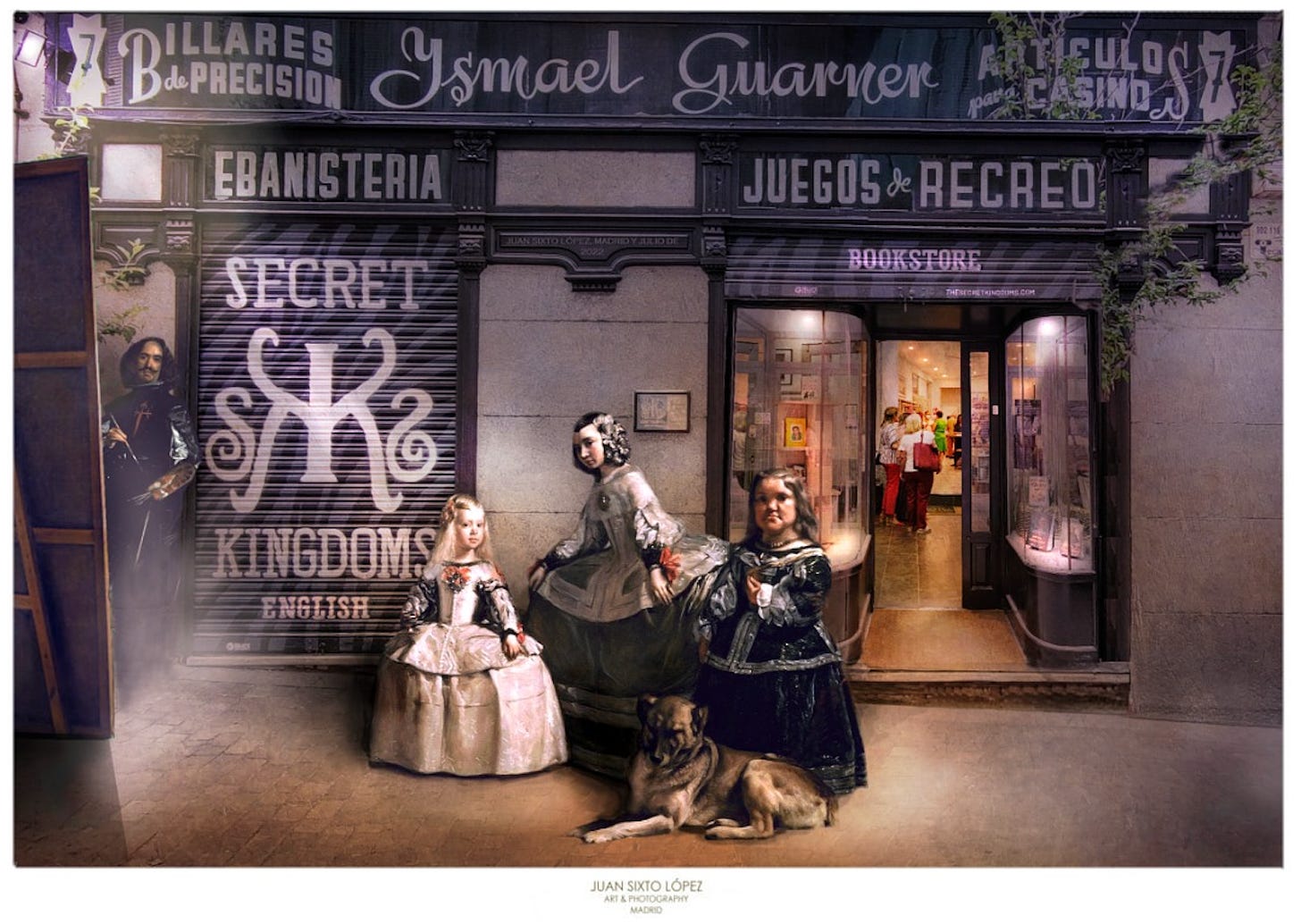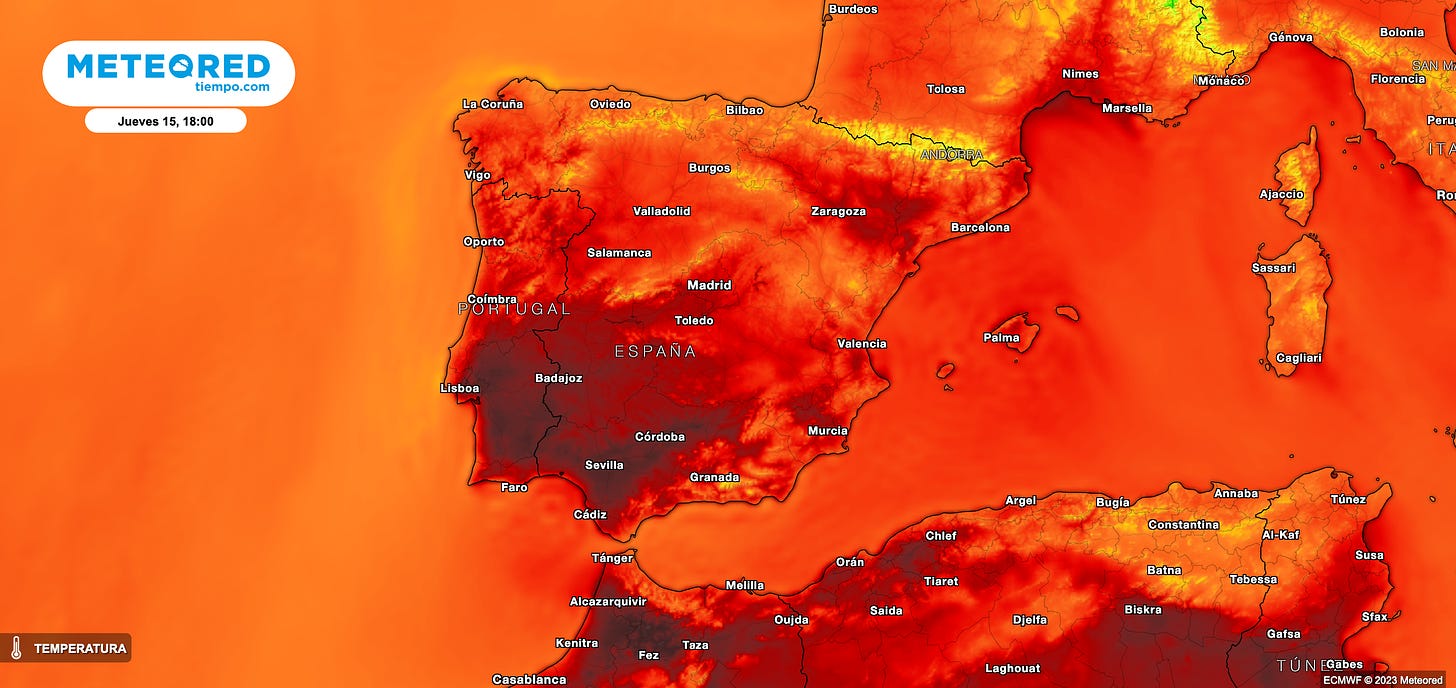🥊 This Week in Spain: The Election Heats Up
Also: Collapsing buildings, more heat waves and disinterments.
By @IanMount and @AdrianBono | June 15, 2023 | Madrid | Issue #18
🎉 Welcome to The Tapa, an English-language, weekly newsletter about all things Spain!
🥜 This Week in a Nutshell: You guessed it: more politics! Which means last minute negotiations, crossed accusations of fascism and communism and other unholy alliances. And we’re sorry to tell you, but this is the way it’s going to be for five more weeks. Yes, we will continue to cover the other stuff (like heat waves and other equally fun topics) but for the time being we’ll be focusing on the 23J elections. Enjoy.
🙏 Remember that if this email gets truncated at the bottom because it’s too long, just click here to read the rest on Substack.
🕺If you haven’t subscribed yet, please do so by clicking on the button below.
🫶 And if you already have, please send this newsletter around to your friends and family and help us keep growing.
Grab the popcorn
🥊 The Gloves Come Off as the Campaign Starts for Reals
We warned you: politics, politics, politics. Yup, with the 23J elections bearing down on us (<6 weeks to go) there’s no way around talking about it. And this week’s been chock full of busy!
Parties have been positioning themselves for the election run—both in terms of who they are, and what they’re against. You can basically break down that self-definition process into 3 buckets—alliances, candidates, and tasty quotes. So without further ado (or, really, any ado) let’s get into that party by party.
Partido Popular (PP)
As the big winner of the 28M municipal/regional elections—and the expected winner of the 23J national version—the center-right PP has everything to lose from campaign surprises and scandals, so they’re largely keeping their collective head down and saying as little as possible. This plays into the strengths of party boss (and presumed next prime minister) Alberto Núñez Feijóo, who is, let’s be honest, rather boring.
To get a flavor of this, take a look at the biggest thing the PP did this week—form a government with Vox in the autonomous community of Valencia. This alliance is arguably scandalous—Vox is a far right party, after all, and the head of their list in Valencia, Carlos Flores, has been convicted of gender violence—and the parties on the left jumped on Feijóo, with Education Minister Pilar Alegría, a Socialist, calling the pact “absolutely shameful and embarrassing”.
Feijóo didn’t respond at first, and when he did, he avoided the scandal. Instead, he noted that the PP had refused to form a government with Flores (who stepped aside to become Vox’s lead national MP candidate in Valencia for 23J), and blamed the PSOE socialists for forcing the alliance by refusing to abstain to allow the PP—the largest parliamentary group in Valencia—to rule alone. It was either form a government with Vox “or have new elections,” he said.
The bottom line: The PP is selling “Nothing to see here.” As in, don’t worry, we’re all calm and moderate. And that will be the party’s mantra throughout the campaign.
PSOE (AKA the Spanish Socialists)
Prime Minister Pedro Sánchez and his party are in the opposite position. Well behind in the polls, they have to make some noise to motivate their voters—and demotivate the other side. And that means promoting fear of a PP-Vox government (see: above Alegría quote and hundreds of others) and promoting uncontroversial things the PSOE government has done well (post-COVID economic recovery? Yes. Solo Sí es Sí law? Never heard of it.)
The PSOE wants to promote itself as the responsible party. To that end, the PSOE has put forth Economy Minister Nadia Calviño—a technocrat who is not a PSOE member and has been generally praised for doing a good job—and contrasted her with the PP (which hasn’t named its econ minister). “Nosotros tenemos a Nadia y ellos tienen a... Nadie,” he said in a rally: “We have Nadia and they have…no one.”
This economic fear is central to the PSOE attracting voters outside of its core. The argument: Not only will the nuts in Vox make the PP take Spain back to the stone age socially, the PP will also plunge Spain’s recovery into economic chaos by going against agreements made with the EU in Brussels.
In Sanchez’s words: “We have launched a successful model and the PP wants to kill it,” he said. “If everywhere we look we find hopeful economic data, what is the point of dismantling the policies that have made it possible? Why should Spain go back and repeal what has been successful? That is the crossroads of the elections. The opposition only uses the verb ‘repeal’. But many of these measures that they want to repeal were incorporated into the recommendations from Brussels.”
Sumar (AKA the left to the left of PSOE)
Sumar boss Yolanda Díaz is trying to put a happy face on her united leftist front after it struck a coalition deal with Unidas Podemos at the eleventh hour last Friday. But the deal left bitter feelings in Podemos, which was basically absorbed in a hostile takeover after it surrendered to Sumar’s demands to cast aside current Equality Minister Irene Montero, who after the “Only Yes Means Yes” law fiasco had become a toxic asset.
Díaz claimed that the Sumar front represented, “the broadest and most plural agreement in the history of democratic Spain”. But it’s also a coalition of people who dislike one another. Podemos leaders complained that the best-known representatives of their party, like Montero or Pablo Echenique, were being unjustly vetoed by scared leftists who were in effect doing the work of the right wing. It felt like anything that could remind voters of former Podemos leader Pablo Iglesias was being tossed, and the Iglesias faction is not happy. When asked about this, Díaz dodged: “Spain was asking for a broad alliance and we’ve done that”.
Díaz, who is also the current Minister of Labor, is trying to shift the subject, saying that her party will push to reform corporate taxes “so large companies contribute more and small ones contribute much less”. She also asked for a discussion on making a temporary wealth tax permanent, a push that will endear her to her base, but won’t do anything to bring in the center.
Vox (AKA the far-right)
Far-right Vox had a great election, not only because it ratcheted up its vote share, but also because in many regions and municipalities—and maybe nationally—the PP will need them to form governments. They got an early win in Valencia (see above) as well as in cities like Elche, so the party is growing—but there are signs there may be limits to their power and their relationship to the PP may be complicated.
The PP in the southeastern community of Murcia on Wednesday decided not to allow the party led by Santiago Abascal to have a seat on the Parliament’s executive council because, well, they think they are powerful enough to force Vox to bend to their will. The PP was the big winner in Murcia in the 28M elections, falling only two seats short of an absolute majority. While the PP will need those two Vox votes to form a government and Vox has said that it is ready to force a repeat election if its demand for the presidency of the regional Assembly is not met, the PP is betting Vox won’t risk the ridiculousness of doing that.
The takeaway: PP boss Feijóo knows he will need Vox to form many governments large and small. But he wants to keep the number to a minimum to not be tarred by the far-right label—and because Vox has been less than competent in its government work. But if this is how negotiations between these two are going to go on a national level, have the popcorn🍿ready!
🔔 A Message From Our Sponsor
Secret Kingdoms is your English bookstore in Madrid. It specializes in Spanish history and literature, contemporary and classic novels, books for children and young adults of all ages, history and historical fiction, thrillers, science fiction, fantasy, poetry, biographies and much more.
Located on Calle de Moratín 7 — a few blocks away from the Prado Museum — and with over 20,000 new and used books, Secret Kingdoms has something for everyone.
Coming up in our reading series:
Lane Greene — Writing With Style — June 16, 7:45 p.m.
A Poetic Evening of parallel texts plus “Open Mike” with Mikey Mondejar — June 17, 7:45 p.m.
Summer Literary Quiz with Wine Tasting — Jun 21, 7:30 p.m.
Find out more at www.thesecretkingdoms.com
💬 Five things to discuss at dinner parties this week:
1. 🪦 Civil War dead are being exhumed—at least for now
Forensic scientists began exhuming the bodies of Civil War dead on Monday from the mausoleum that diminutive dictator Francisco Franco had built at the Valle de los Caídos—now renamed the Valle de Cuelgamuros—about 50 km. northwest of Madrid.
The massive tomb and even more massive cross were originally meant only for dead from the Nationalist (pro-Franco) side, but for some reason admission was opened to Republicans—historians suggest that it was a Vatican condition for putting a basilica on the site, or a way to get in good with the international community.
Thousands of Republican bodies were dug up without their families’ consent and moved to the site. With both sides represented, a reported 33,847 bodies were buried in boxes of various sizes.
The push to convert the mausoleum from a site of Francoist pilgrimages to a memorial to the estimated 500,000 who died in the Civil War has come in fits and starts, but took on new urgency under the Pedro Sánchez government. Franco’s body was removed from the site in 2019, Falange founder José Antonio Primo de Rivera was exhumed in April, and in October 2022 the government passed a new “Democratic Memory Law”, meant to preserve and teach the history of the dictatorship and remove its remaining symbols.
The exhumation of the first 128 dead, as requested by their families, is part of this movement. Most are from the Republican side, but several (5) are Nationalist dead.
The 15 forensic scientists involved will begin at the bottom level of the Capilla del Santo Sepulcro, where they will look to identify 18 of the bodies requested, then move up to identify 59 more, on their way to 128 in total.
The beginning of the exhumation coincides with the national election campaign, and has not been without, er, controversy.
Madrid regional governor Isabel Díaz Ayuso of the rival PP accused the Sánchez administration of using the exhumations as a campaign tool: “Campaigning on this seems outrageous to me.”
The families of those interred at the site, who’ve been pushing to exhume and rebury their relatives for years, shot back that the exhumations were above politics: “Finally, what we families have been demanding for so many years is being done," they said. "Our dead and our stories are not debatable or subject to be exploited for electoral or partisan purposes. It is about human rights.”
The families were also peeved that they learned about the exhumations from the press and won’t be present at the exhumations, while the Franco family got to carry him out in a coffin.
The biggest reason why the families want the exhumations to be performed without any more delays? PP boss Alberto Núñez Feijóo has said he would repeal the Democratic Memory Law if he leads the next government, and they fear this will lead to another pause in a process they’ve waited for years to start.
2. 🐟 Google declares the day of the espeto
You may have noticed something curiously Spanish about Google on Monday: the search site’s daily Doodle (handcrafted in clay) portrayed an espeto. But why?
First, however, some of you must be asking, “What’s an espeto?”
If you’ve ever been to Málaga, you’re certainly acquainted with the beachfront chiringuitos with bbq grills made out of small boats where they cook sardines (and other seafood) on little sword-like spits. These skewers are the espetos (and espetar means…to skewer). According to Google, the snack's origins date back to the late 19th century, when cooked skewered fish in the sand next to a fire for a quick meal. They tried a variety of seafood, but over time, sardines became the most common choice.
Legend holds that when the inventor of the espeto served them to King Alfonso XII in 1885 and saw the royal guy prepare to attack them with a knife and fork, he said, “Majestad, 'asina' no, con los 'deos'” (“Your majesty, not like that…with your fingers.”)
Insider’s tip: Espetos are only meant to be eaten in months without an ‘R’ in their name and never on Monday because…no fish markets on Mondays. This is the exact opposite of oysters (which you only eat in months with an ‘R’ in their name), which explains why you’ve never seen an oyster and an espeto in the same room (a la Superman and Clark Kent).

Why did Google choose June 12 to celebrate the espeto? On that day in 2006, the city of Málaga unveiled a statue of the Espetero — the person who makes the skewers — to celebrate his work. The statue is on the Paseo Marítimo Antonio Banderas (yes, Tony Flags has his own boardwalk in Málaga—he is the city’s patron saint, after all). Because espetos are amazing. Here’s are the 10 best places to eat them around Málaga.
3. 🌞 You’re going to miss the rain
Say goodbye to Spain’s very heavy recent storms. It felt like the rain never stopped this spring—though it was somehow also the hottest and second-driest on record (huh?). That’s been tough on the southern half of Spain, where the population is water-soluble.
But the heat is returning with a vengeance—and how. Spain and Portugal are set to hot up this weekend, with temperatures in the southwestern part of the Iberian peninsula expected to hit 40°C on Saturday. (Unlike the maps on Spanish TV, which deny that Portugal has weather, we include our neighbors in this heatwave.)
And it’s going to get even hotter after that. The temp in Seville is forecast to peak near 45°C later in June, according to Bloomberg. That’s 113°F, if you’re counting. That’s caña weather, because a doble would be lukewarm before you got through it.
Not to scare you, but…well, check out that red map!
4. 👮🏼 Tragic death of a policeman by friendly fire
Forty-year-old Policía Nacional officer Juan José Lara was accidentally shot and killed on Sunday morning by his partner during a confrontation with a local man who was threatening them with a knife. The incident took place in the town of Andújar, in the Andalusian province of Jaén, and is still being investigated by the police. This tragic story was all over the news this week as it was caught in full on camera (Warning: graphic video above).
The local man banged on the door of an apartment building on Las Monjas street in Andújar. Seeming agitated, he threatened the building’s residents and, according to witnesses, was holding a knife and a hammer. (Local media would later say he was a retired veterinarian who suffered from schizophrenia).
Nearby residents began looking out their windows and filming with their phones. Several of them alerted the police.
Juan José Lara was on patrol with his partner when they were alerted of the situation. Upon arriving at the scene, his partner got out of the patrol car and asked the man to put down the knife (Lara was driving, so lagged behind). When the man refused and started approaching Lara’s partner, the officer began walking backwards and pulled out his gun. He ordered the man to drop the weapon.
As Lara was running towards them, the attacker lunged at his partner, causing him to lose his balance. As he was falling, the officer fired his weapon and hit the man in the leg. However, the bullet went through and hit Lara in the abdomen. In the footage provided by area residents, Lara can be seen grabbing his stomach and falling to the ground while people scream from the windows and balconies.
The assaulted officer was helped by local residents, but the attacker managed to injure him in the head and face.
Lara died from his partner’s accidental shot on the way to the hospital. The attacker died too, and an autopsy revealed that he had died from the bullet that went through him before hitting Lara, meaning the same bullet killed both.
Both Andújar and the nearby town of Marmolejo, where Lara was from, declared three days of mourning and the Marmolejo City Council proposed granting Lara the Gold Medal of Marmolejo posthumously “to honor his memory”.
5. 🏙 That 5-story building that collapsed in Teruel
A five-story residential building with 21 apartments in downtown Teruel collapsed on Tuesday morning, minutes after all of its residents were evacuated. A video made the rounds this week and it’s clear that it’s a miracle that no one got hurt.
In the footage, people scream “get back!” as the entire structure begins to fall apart. Luckily no fatalities were reported, according to the local Fire Department.
Hours before the collapse, people in the building reported hearing “noises and creaking,” which made them fear imminent structural collapse. Emergency services immediately proceeded to evacuate the structure.
The causes of the collapse are still being investigated, but local media suggests that it could be due to the heavy rainfall recorded in Teruel on Monday. Sources from the provincial Fire Department told local media that they had to replace sewer covers that had been dislodged due to water pressure on the same street where the building was located. Eight other buildings had to be evacuated in the area, leaving 300 people homeless.
🙏 Before you go, please remember to share this newsletter with your friends on social media. The more we grow, the more information we’ll be able to offer each week.
We’ll be back next week with more.









Love the newsletter! Thanks for such a great resource!
Thanks for the great summary of the elections. For someone who doesn't have time to scour the news sources, this was a really informative and interesting update on what's going on. Thank Zeus they're not as drawn out as the US elections!